
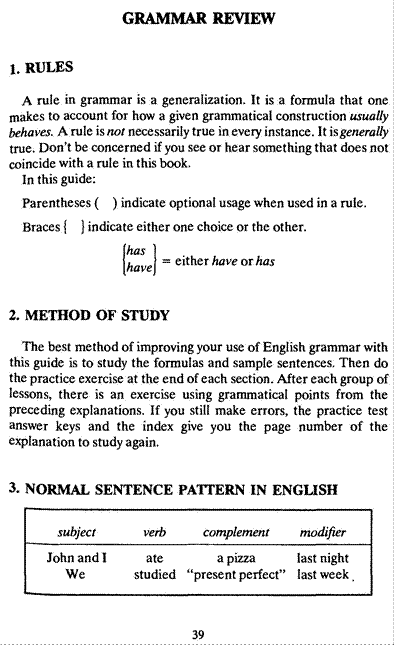
40 SUBJECT AREA REVIEWS
The subject is the agent of the sentence in the active voice; it is the person or thing that performs or is responsible for the action of the sentence, and it normally precedes the verb. N o t e: Every
sentence in English must have a subject. (In the case of commands, the subject [you] is understood.) The subject may be a single noun.
Coffee is delicious.
Milk contains calcium.
The subject may be a noun phrase. A noun phrase is a group of words ending with a noun. (It ca nn ot begin with a preposition.)
The book is on the table.
That new red car is John’s.
Examples of subjects:
![]() We girls are not going to that movie.
We girls are not going to that movie.
George likes boats.
Mary, John, George, and I went to a restaurant last night.
The weather was very bad yesterday.
The chemistry professor canceled class today.
The bank closed at two o’clock.
It can act as a pronoun for a noun or can be the subject of an impersonal verb. As the subject of an impersonal verb, the pronoun is not actually used in place of a noun, but is part of an idiomatic
expression.
It rains quite often here in the summer. It is hard to believe that he is dead.
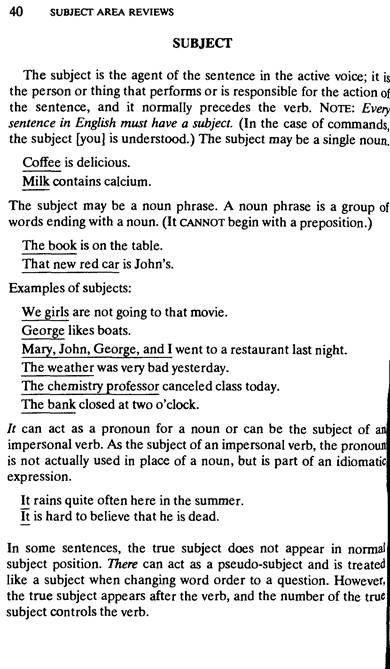 In some sentences, the true
subject does not appear in normal subject position. There can act as a
pseudo-subject and is treated like a subject when changing word order to a
question. However, the true subject appears after the verb, and the number of
the true subject controls the verb.
In some sentences, the true
subject does not appear in normal subject position. There can act as a
pseudo-subject and is treated like a subject when changing word order to a
question. However, the true subject appears after the verb, and the number of
the true subject controls the verb.
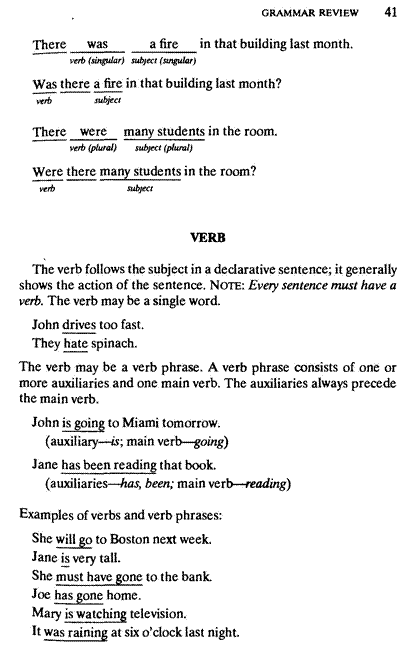
42 SUBJECT AREA REVIEWS
A complement completes the verb. It is similar to the subject because it is usually a noun or noun phrase; however, it generally
follows the verb when the sentence is in the active voice. Note: Every sentence does not require a complement. The complement cannot begin with a preposition. A complement answers the question what? or whom?
Examples of complements:
John bought a cake yesterday. (What did John buy?)
Jill was driving a new car. (What was Jill driving?)
He wants to drink some water. (What does he want to drink?)
She saw John at the movies (Whom did she see at the last night. movies?)
They called Mary yesterday. (Whom did they call yesterday?)
He was smoking a cigarette. (What was he smoking?)
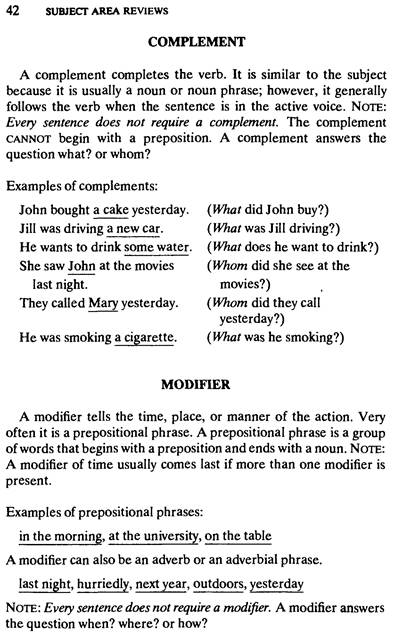 A modifier tells the time,
place, or manner of the action. Very often it is a prepositional phrase. A
prepositional phrase is a group of words that begins with a preposition and
ends with a noun. Note: A
modifier of time usually comes last if more than one modifier is present.
A modifier tells the time,
place, or manner of the action. Very often it is a prepositional phrase. A
prepositional phrase is a group of words that begins with a preposition and
ends with a noun. Note: A
modifier of time usually comes last if more than one modifier is present.
Examples of prepositional phrases: in the morning, at the university, on the table
A modifier can also be an adverb or an adverbial phrase.
last night, hurriedly, next year, outdoors, yesterday
Note: Every sentence does not require a modifier. A modifier answers the question when? where? or how?
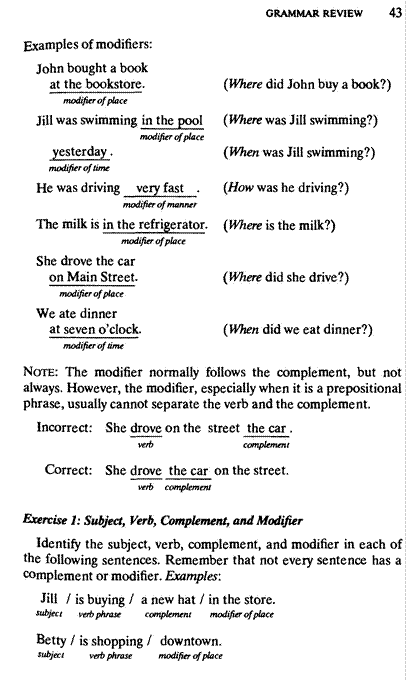
1. George is cooking dinner tonight.
2. Henry and Marcia have visited the president.
3. We can eat lunch in this restaurant today.
4. Pat should have bought gasoline yesterday.
5. Trees grow.
6. It was raining at seven o’clock this morning.
7. She opened a checking account at the bank last week.
8. Harry is washing dishes right now.
9. She opened her book.
10. Paul, William, and Mary were watching television a few minutes ago.
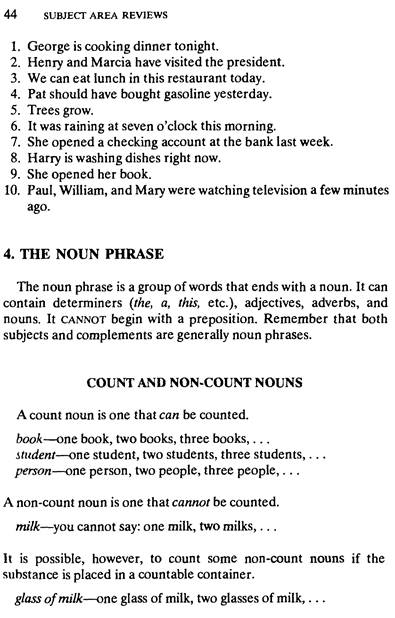 The noun phrase is a group
of words that ends with a noun. It can contain determiners (the, a, this,
etc.), adjectives, adverbs, and nouns. It ca nn ot
begin with a preposition. Remember that both subjects and complements
are generally noun phrases.
The noun phrase is a group
of words that ends with a noun. It can contain determiners (the, a, this,
etc.), adjectives, adverbs, and nouns. It ca nn ot
begin with a preposition. Remember that both subjects and complements
are generally noun phrases.
A count noun is one that can be counted.
book—one book, two books, three books,... student—one student, two students, three students,... person—one person, two people, three people,...
A non-count noun is one that cannot be counted. milk—you cannot say: one milk, two milks,...
It is possible, however, to count some non-count nouns if the substance is placed in a countable container.
glass of milk—one glass of milk, two glasses of milk,...
Материалы на данной страницы взяты из открытых источников либо размещены пользователем в соответствии с договором-офертой сайта. Вы можете сообщить о нарушении.